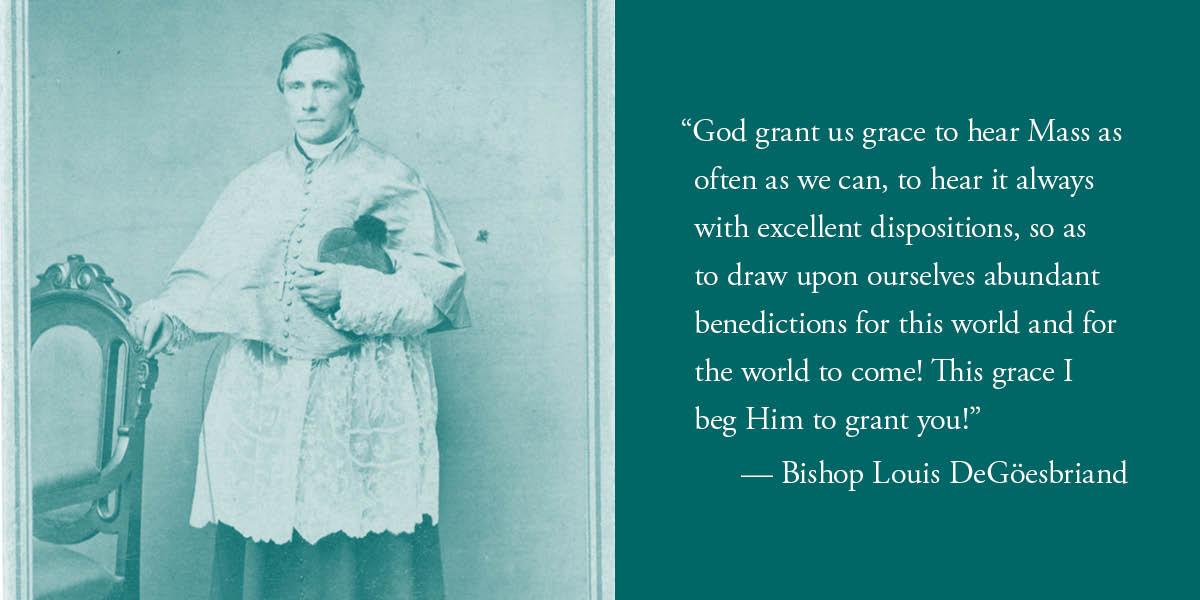
Meditate on Bishop deGoësbriand’s ‘dispositions’ for active, fruitful participation in liturgy
The first bishop of Burlington, Bishop Louis deGoësbriand, speaks of the proper dispositions for attending Mass by making the following points. Keep in mind that during his lifetime, the Mass still followed the Tridentine form (or from our perspective, “the extraordinary form”) so that discussion of Mass involved “hearing Mass” compared to the later reform of the liturgy which speaks about “active participation.” The reception of graces has not changed: It is the same Jesus present during the sacrifice, but are we properly disposed to receive those graces fruitfully?
Bishop deGoësbriand states: “The good Christian begins to prepare himself (for Mass) as soon as he wakes and banishes from his mind whatever does not relate to the Mass he is about to hear. … Come to Mass fasting if you can, for this is very pleasing to God. …During the morning, banish all temporal affairs from your mind. … Hold no conversation when you come to Mass. … Always give some time before Mass to interior recollection, craving pardon for your sins, trying to discover the graces you particularly need so as to ask for them during the Mass. When you enter the church, make an act of faith concerning the greatness of the sacrifice and also an act of contrition for your sins. … A proper use of holy water blots out venial sins and prepares the soul to hear Mass properly.”
In 1876, Pope Pius IX renewed the conditions for a partial indulgence for the use of holy water with the following:
- The sign of the cross must be made with the holy water.
2. We must say: “In the name of the Father and of the Son and of the Holy Spirit.”
3. We must have contrition for our sins.
4. For this, as for any indulgence, we must be in the state of grace.
The bishop continues: “During Mass we should entertain in our souls sentiments of the deepest humility. There are many who, during the Sunday Mass, commit more sins than during the whole week. Some do not even think of God, others spend their time talking, and the minds and hearts of many are filled with evil thoughts or criminal desires. Do not say that it might be better not to go to Mass! You must go to Mass, and you must hear it properly by making three sacrifices to God: (1) Sacrifice to Him your body, in honoring Jesus Christ, by a modest and devout posture. (2) Sacrifice to Him your mind, by humbly acknowledging (your sinfulness), avoiding distractions and repelling useless and dangerous thoughts. (3) Sacrifice to Him your heart. This is the offering most acceptable to Him, for He never ceases to say to us … ‘Give me thy heart.’
God grant us grace to hear Mass as often as we can, to hear it always with excellent dispositions, so as to draw upon ourselves abundant benedictions for this world and for the world to come! This grace I beg Him to grant you!”
Bishop deGoësbriand had an extreme love and respect for the Holy Mass. A century ago he begged God’s graces for his spiritual descendants that we too might love the Mass and be properly disposed to receive graces from it. We do well to meditate upon his dispositions for the active and fruitful participation in the liturgy no matter under what form it is offered.
Sources: “Christ on the Altar” Bishop Louis deGoësbriand, Worcester, Mass., Benziger Brothers, 1890, pp. 476-485 op. cit.
“The Handbook of Indulgences: Norms and Grants.” New York: Catholic Book Publishing, Co., 1991. p. 82
Weathers, Frank. “For all the Sacramentals: Holy Water.” Why I am Catholic. Feb. 19, 2011. patheos.com/blogs/yimcatholic/2011/02/for-all-the-sacramentals-holy-water.html.
—Father Lance Harlow is pastor of Corpus Christi Parish based in St. Johnsbury.
—Originally published in the Winter 2022 issue of Vermont Catholic magazine.

